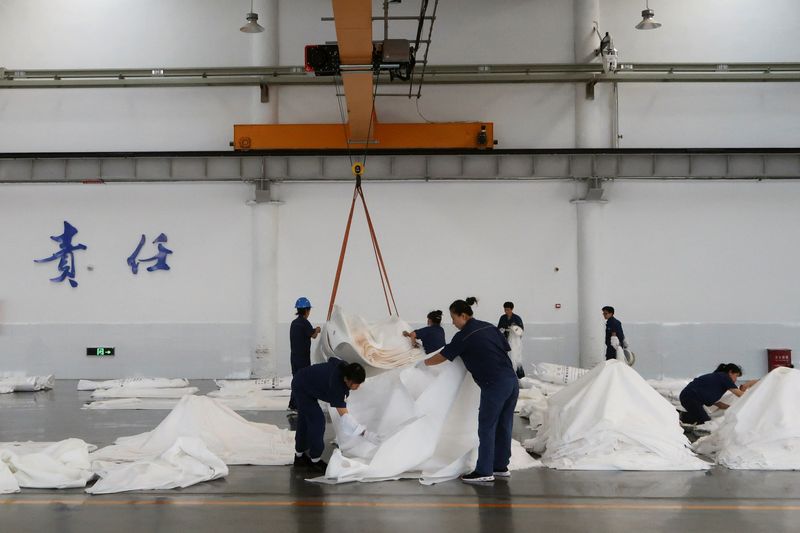BEIJING (Reuters) -China's factory activity unexpectedly contracted in October, two surveys showed this week, renewing concerns over the state of the country's sprawling manufacturing sector and its fragile economic recovery at the start of the fourth quarter.
Adding to a downbeat official manufacturing purchasing managers' index (PMI) on Tuesday, a private survey on Wednesday suggested the manufacturing sector is still not on as solid a footing as previously thought, despite China's better-than-expected third-quarter gross domestic product growth.
The Caixin/S&P Global manufacturing PMI fell to 49.5 in October from 50.6 in September, marking the first contraction since July and missing analysts' forecasts of 50.8 by a large margin. The 50-point mark separates growth from contraction.
A slowdown in Chinese manufacturing will also soften China's imports. Manufacturers in countries including Japan and South Korea are heavily dependent on demand from their giant neighbour for items such as industrial machinery.
Following the release of the gloomy data, China shares eased 0.15%, while Hong Kong's Hang Seng Index fell 0.75%. Three-month copper on the London Metal Exchange also dropped 0.2% to $8,095 per metric ton by 0201 GMT.
"The main drag on the PMIs comes from the demand side," said Bruce Pang, chief economist at Jones Lang Lasalle, while noting the eight-day Golden Week National Day holiday disrupted production at some factories.
"There will be more challenges for the manufacturing sector in the fourth quarter as most factories rush to finish work by the end of the year, making December a low (production) season," he added.
PMI surveys track business conditions and offer the first monthly snapshot of China's economic performance.
If hard data, including October's industrial output and profits, released later this month are similarly weak, more will need to be done to ensure China's recovery does not backslide, according to a note Capital Economics on Tuesday.
WEAK SENTIMENT
The data signalled a renewed deterioration in manufacturing conditions as factories reported a fresh fall in production amid slower growth in overall sales dampened by weak foreign demand, according to the Caixin survey.
New export orders for Chinese manufactured goods have shrunk for four consecutive months amid a relatively sluggish global economic climate.
At the world's largest trade show in southern Chinese city of Guangzhou, foreign buyers returned, but sellers said orders remain low even as the peak Christmas shopping season nears.
Lower production and relatively muted client demand weighed on purchasing activity, which shrank for the first time since July, while weaker-than-expected sales and the delayed shipment of goods led to the strongest rise in inventories of post-production items since September 2015.
Manufacturers trimmed their staffing levels for the second straight month, with the rate of job shedding the quickest since May.
Analysts at Goldman Sachs (NYSE:GS) said in a note the labour market still showed signs of weakness in the third quarter as employment sub-indexes under various PMIs mostly declined in the quarter.
Citing higher prices for raw materials and oil, manufacturers said the rate of input inflation ticked up to nine-month high.

Business confidence for the year ahead softened again last month, hitting its lowest since September 2022. While some companies were hopeful that new product launches and improved client demand both at home and overseas would support growth, others expressed concerns over the sluggish global economic climate.
($1 = 7.3188 Chinese yuan renminbi)